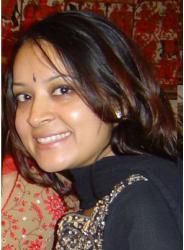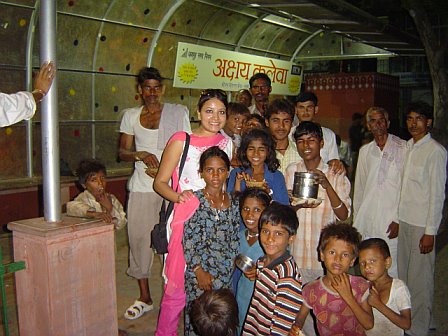Contribute
| Lokvani Talks To Shikha Bhatnagar |
Ranjani Saigal
02/07/2007
Shikha Bhatnagar, originally from Las Vegas, NV, is currently Executive Director of the Akshaya Patra Foundation, USA, a non-profit organization that implements a large-scale school-feeding program in various parts of India. Prior to assuming her position at Akshaya Patra, Shikha joined the U.S. Government as a Presidential Management Fellow (PMF) and served as an International Trade Specialist in the Office of Textiles & Apparel at the U.S. Department of Commerce, where she worked on international trade policy. Bhatnagar also has experience with the United Nations Development Fund for Women (UNIFEM) on gender and trade issues, with the International Labor Rights Fund (ILRF), and has spent time working with rural development organizations in India. Bhatnagar spoke to Lokvani about her life and goals for Akshaya Patra. You have lived most of your life in the United States. What motivated you to join Akshaya Patra, an NGO helping children in India? I have always had a great interest in working with developing countries particularly in the areas of gender issues and women’s rights. After completing my undergraduate degree, I spent several months in India working in Rajasthan under the auspices of the Gramin Vikas Vigyan Samiti, a non-profit focusing on rural development issues. Through this experience, I gained first-hand exposure to economic and political development issues in India. Later I worked with several organizations including the United Nations, the International Labor Rights Fund and the U.S Department of Commerce. Although working at the Department of Commerce was an interesting and rewarding experience, I never truly felt I was making a tangible positive impact. It is interesting to note that I often used the expression “it is not like I am feeding the world’s children†to express my exasperation with the fact that I was not making a direct impact with my work. When Nishith Acharya, the Executive Director of the Deshpande Foundation, brought this position at Akshaya Patra USA to my attention, I was delighted because it was a position that combined many of my skills and experiences and it gave me the opportunity to indeed feed children. As someone who grew up in the U.S. public school system, I saw the benefits of the school lunch program. To be able to help replicate something similar in India and to such a large scale was an amazing opportunity. However, I would have never taken the this position if I didn’t truly believe in the organization, and I hadn’t been so impressed by the kitchens and the devotion of the staff and volunteers on the ground. I truly believe Akshaya Patra has and will continue to have a huge impact on improving the lives of millions of children in India. Prior to joining Akshay Patra, you have held a series of very interesting jobs. Could you describe some of those experiences for us? After graduate school I was chosen as a Presidential Management Fellow and worked as an International Trade Specialist in the Office of Textiles & Apparel at the U.S. Department of Commerce, where I helped negotiate bilateral trade agreements and assisted the U.S. industry with market access and compliance issues in foreign countries. In this position, I learned about the complexities of the textile trade, and how significant it is to not only the United States, but to many developing countries. The textile industry also has a large impact on women’s livelihoods, since it is a major employer of low-skilled women in many countries. Prior to joining the Federal Government, and during my time at Columbia University, I had the opportunity to consult for the United Nations Development Fund for Women (UNIFEM), where I performed a multiregional assessment of UNIFEM’s gender and trade programs in parts of Latin America, Sub-Saharan Africa, and the South Pacific. This project took me to Fiji where I had a unique opportunity to meet with key stakeholders at all levels, from senior government officials, to non-profit leaders, and women at the grassroots level to whom these programs were directed. Our assessment was provided to UNIFEM, and some key changes were implemented as a result of our report. At the International Labor Rights Fund (ILRF), an NGO committed to protecting the rights of workers all over the world, I gained a firm understanding of labor rights issues, the complexities, and particularly the potential of public/private/non-profit partnerships in achieving mutually beneficial results while protecting the rights of laborers. Could you tell us more about Akshaya Patra? Akshaya Patra, started in 2000, is currently the largest NGO school lunch program of its kind in the world. It addresses two of the most immediate challenges facing India – hunger and education, by providing nutritious school lunches to underprivileged children on a daily basis. These lunches provide incentives for these children to attend school, stay in school, and gives them the nutrients that increases their cognitive ability and their performance in the classroom. We are currently feeding over 535,000 children on a daily basis, and have the goal of reaching one million children by the year 2010. And, the best part is that we do this at a very low cost – as little as 13 cents per child per day, or $28 per child for an entire school year. How does Akshay Patra manage to keep the cost low? The technology used in our kitchens allows us to produce large quantities of nutritious food in a short amount of time. We operate two primary models – a centralized model and a decentralized model. In the former case, food is cooked in a large centrally located kitchen and loaded onto trucks, which distribute the food to area schools. Each of these kitchens contains machinery that can produce enough sambar and rice (or chapattis and vegetables in the north) to feed up to 250,000 children per day. In the decentralized model, implemented in rural areas where transportation is costly and difficult, we have set up small kitchens adjacent to the schools where we employ local women to cook meals for the school. These women are trained in hygiene and cooking techniques, so regardless of whether the meal is coming from a high-tech kitchen in Bangalore, or if it is coming from a rural kitchen, the lunches maintain consistency in quality. The state and central governments have also provides some assistance to help keep the costs low. Why do you focus on providing food as a means to improve education? Malnourishment is a crucial issue in India, where one third of the world’s malnourished children live. India has more malnourished children than parts of Sub-Saharan Africa. And, despite India’s economic growth, the situation for tens of millions of Indian children remains dire. Studies have proven that poor nourishment has a negative effect on the cognitive ability of children, therefore providing a nutritious school lunch creates an incentive for these children to come to school, receive a healthy meal (often their only meal of the day), and actually concentrate in the classroom, rather than on their hungry stomachs. AC Nielson recently peformed an impact assessment on Akshaya Patra’s program, and reported an increase in school enrollment and performance (particularly for girls), where Akshaya Patra’s meals were being served. What is your vision for Akshaya Patra? What can people do to help this worthy cause? First and foremost, we need financial support. A mere $28 feeds one child for an entire year. That is the cost of a dinner at a restaurant here in the U.S., yet this amount can have a profound effect on the life of child in India by giving them a nutritious meal every single day for the whole school year. We are also in need of volunteers who can help us raise funds and awareness. If you have some time to spare in your busy schedules, Akshaya Patra would love your support. Akshaya Patra recently launched its Boston Champion Circle, a group of community leaders who have come together to build momentum behind Akshaya Patra’s efforts in the U.S. If you are interested in volunteering, please contact us 781-438-3090 or email tapf.info@akshayapatrausa.org. This is a great way to do something truly meaningful, while meeting new people and building leadership skills. Do you have any special advice for Indian American youngsters who like your self are growing up in the United States? Regardless of whether you are leaning towards a career in the non-profit sector, law, medicine, etc. I would recommend taking advantage of the flexibilities you have while you’re young to explore different opportunities, particularly those that are out of your comfort zone, such as joining the Peace Corps or working with inner-city kids. Sure, you won’t make a lot of money, but you have plenty of time for that, and these experience are often priceless. For me, working and living in a remote village in India was perhaps one of the most difficult and yet rewarding experiences I have ever had. Any special message for our readers? As a new resident to this area, I want to thank the Indian-American community in the Boston area for their warmth and hospitality. They have been so supportive of me personally and of Akshaya Patra. I look forward to working with them to help scale Akshaya Patra’s operations to new heights. I am confident that they will continue to be a beacon of hope for millions of children in India who desperately need their help. Thanks for your time. Thank you.
Bhatnagar graduated from Columbia University's School of International and Public Affairs with a Masters degree in International Affairs in 2001. She received her B.A. in International Relations and Political Science from the University of Wisconsin, Madison.
Bhatnagar has been extensively involved with the Indian-American community. She is an alumnus of the Indian American Center for Political Awareness (IACPA) Washington Leadership Program, served on the Executive Board of the Network of South Asian Professionals (NetSAP), in Washington, DC, and the Upakar Foundation, an Indian-American scholarship program. She also held the position of Community Network Director for Indus Women Leaders, DC.
I believe Akshaya Patra will achieve its goal of serving one million children before the year 2010. My vision for Akshaya Patra beyond this milestone is that it will achieve its mission of ensuring that no child in India, and in the world, is denied equitable access to food, nutrition, and education. However, when this can be achieved is largely dependent on mobilizing people around this important issue and creating awareness.
You may also access this article through our web-site http://www.lokvani.com/

